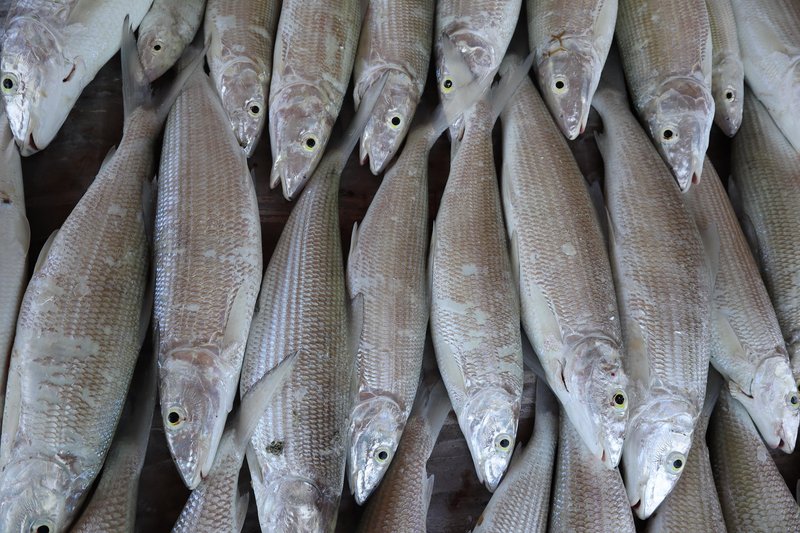Jan Webinar: Topics at the nexus of climate change, fisheries & blue foods
10 AM–11 AM | Online | PublicA webinar series highlighting the impact of climate change on fisheries, aquaculture, and the communities who depend on them.

January 2025 Webinar: Managing fisheries in a changing climate
Jointly hosted by the UN Ocean Decade Programs Blue Food Futures, Fisheries Strategies for Changing Oceans and Resilient Ecosystems (FishSCORE), Sustainability, Predictability, and Resilience of Marine Ecosystems (SUPREME), Sustainability of Marine Ecosystems through Global Knowledge Networks (SmartNet), and Fisheries and Marine Ecosystem Model Intercomparison Project (FishMIP) and endorsed project Basin Scale Events and Coastal Impacts (BECI).
This webinar series highlights current efforts and challenges at the climate-fisheries nexus. Presentations and discussions will range from data-driven efforts to better understand oceanographic and biological changes affecting fisheries, to how the results can be used to inform fisheries management, aquaculture, and sustainable food decisions, to the many ways people and broader communities are being impacted by and adapting to changes in marine ecosystems and marine resource use.
Presentation 1: Transboundary fisheries governance in the Western Indian Ocean under climate change
Regional fisheries bodies (RFBs) are the primary institutions responsible for transboundary fisheries governance. These institutions are, however, coming under increasing strain due to the rapidly changing dynamics that climate change introduces. We addressed three specific questions to ascertain the preparedness of RFBs in the Western Indian Ocean (WIO) to respond to the impacts of climate change on transboundary fisheries: (i) What are the barriers to implementing management strategies under climate change among RFBs? (ii) What new interventions are needed to ensure sustainable management of transboundary fish stocks? and (iii) What criteria are most effective in assessing the preparedness and capacity of RFBs to manage transboundary resources during climate change? RFBs are examined on the breadth of their institutional characteristics, compliance and enforcement measures (CEMs), conservation and management measures (CMMs), and available science in policy documents. We show that RFBs in the WIO possess some structural elements to achieve effective fisheries governance. However, considerable technical, political, and socioeconomic barriers undermine the pace and scope of required timely responses to climate-related changes to transboundary stocks. This study supports the need for RFBs to identify physical, chemical, and environmental processes of critical ocean habitats, capture broader societal and economic considerations in decision-making processes, find joint approaches to integrating competing geo-political interests, and where appropriate, local management structures within transboundary contexts.
Webinar Presenter: Dr. Emmanuel Mbaru is working as a senior scientist at Kenya Marine and Fisheries Research Institute (KMFR) and a Post-doctoral research fellow at Lancaster University (UK). He holds a PhD in Marine Science from James Cook University, Australia. Dr. Mbaru studies interdisciplinary research topics that examine the vulnerability of coastal communities and ecosystems to environmental change. His current interests are embedded in the emerging concepts in network science and fisheries ecology to understand better how and why conservation goes to scale.
Presentation 2: Adaptive Fisheries Assessment in a Changing Ocean (SAP- ICATMAR)
The Catalan Institute of Research for the Governance of the Sea (ICATMAR) is a collaborative organ with management autonomy, jointly established by the Directorate-General for Maritime Policy and Sustainable Fisheries of the Catalan Government and the Spanish National Research Council (CSIC), through the Institute of Marine Sciences of Barcelona. It was created with the aim of providing high-quality scientific advice to the administration in the field of marine science. Since 2019, ICATMAR’s Adaptive Fisheries Assessment in a Changing Ocean (SAP) project has been conducting an exhaustive and continuous monitoring of the fishery resources along the Catalan coast (NW Mediterranean). The data collected helps improve understanding of species biology, community characteristics and fishing gear selectivity. Both internal and external data sources, such as sales notes, fishing fleet census, and vessels geolocation data (VMS), are used to generate valuable knowledge. This data provides key biological information for fisheries assessment, including size frequencies, reproductive seasons, and size at first maturity of target species. The acquired knowledge provides tools to address the different scenarios and challenges within ICATMAR’s field of action: building resilience to climate change, adapting management measures to the fishing sector and actively engaging in technical and co-management committees, among others.
More information: https://www.icatmar.cat/en/fisheries/
Webinar Presenter: Ferran Bustos is a biologist with expertise in marine and fisheries biology, developed through his prior experience and three years of work at ICATMAR. His responsibilities are divided between the communication team and the sampling team. As part of the communication team, he manages social media, creates content for the website, drafts reports, and contributes to outreach activities. On the sampling team, he joins fishing vessels to conduct sampling across various fishing gear types and analyzes the collected samples in the laboratory. In addition, Ferran actively participates in scientific studies utilizing data obtained from the monitoring of the fisheries resources along the Catalan coast carried out by ICATMAR since 2019.
